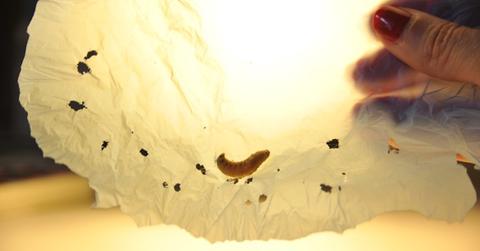Wax Worms’ Saliva Can Dissolve Plastic, According to Recent Spanish Study
Published Oct. 5 2022, 12:22 p.m. ET

A team of CSIC researchers has discovered that wax worm saliva degrades plastic; a discovery with numerous applications for treating or recycling plastic waste. Back in 2017, the team discovered that this worm species (the lepidopteran Galleria mellonella) is able to break down plastic (polyethylene), and now they have discovered just how it does this: its saliva contains enzymes (pertaining to the phenol oxidase family) that can rapidly set off polyethylene degradation at room temperature. These enzymes are the first and only known enzymes capable of degrading polyethylene plastic without requiring pre-treatment, according to Federica Bertocchini, a CSIC researcher at the CIB-CSIC (Centre for Biological Research) who led the study. The results of the work, pending review, have been published in preprint in the BioRxiv online archive. The study was partly funded by Roechling Foundation (Germany).
Plastic pollution is wreaking havoc on planet Earth — many varieties leach harmful chemicals into soil and groundwater. And unfortunately, plastic almost never fully biodegrades. Instead, it breaks down into microplastics, residing in oceans, our soil, and eventually, in the bodies of humans and animals alike.
However, a recent study shows plastic-eating wax worms may be able to solve our planet's plastic pollution issue, by breaking down plastic with enzymes in their saliva.
This could be a monumental finding to curbing worldwide accumulation of plastic waste.
"Plastic degradation by biological systems with re-utilization of the by-products could be a future solution to the global threat of plastic waste accumulation," reads the abstract of the study, titled Wax worm saliva and the enzymes therein are the key to polyethylene degradation by Galleria mellonella, which was published to Nature Communications on Tuesday, Oct. 4.
"...the saliva of Galleria mellonella larvae (wax worms) is capable of oxidizing and depolymerizing polyethylene (PE), one of the most produced and sturdy polyolefin-derived plastics," it continues.
"To the best of our knowledge, these enzymes are the first animal enzymes with this capability, opening the way to potential solutions for plastic waste management through bio-recycling/up-cycling."
Watch the video, below, which is complete with English subtitles.
How do wax worms eat plastic?
Wax worms effectively dissolve plastic with the power of their saliva — how cool is that?
Per the study, polyethylene (PE) makes up about 30 percent of synthetic plastic, and unfortunately, it's incredibly resistant to breakdown. That's where wax worms come into play — researchers from the Spanish National Research Council found their saliva contains enzymes that belong to the hexamerin/prophenoloxidase family, which can oxidize the PE at room temperature, within only a few hours.
"To-date, only mechanical recycling is being applied at a large scale," the study reads. "The larvae of Galleria mellonella, also known as wax worms (ww), can oxidize PE within one hour from exposure, making it the fastest known biological agent capable of chemically modifying PE."
According to The BBC, this finding was discovered in 2017, but this new study shows it's the enzymes in the saliva, in particular, that break it down when exposed to oxygen.
"What we think is that the enzymes are capable of an accelerated version of the weathering of polyethylene," Dr Clemente Arias, a co-author from the Spanish National Research Council, told The BBC.
"What we found was that the enzymes alone can oxidize plastic, which is the process that takes such a long time in the environment," he stated.
How can this be applied to current recycling methods?
Although more research is to be done about how wax worms can be applied to current recycling methods, researchers foresee a future with wax worms as the main focus of plastic breakdown.
"We can imagine a scenario where these enzymes are used in an aqueous solution, and litres of this solution is poured over piles of collected plastic in a waste management facility," Researcher Federica Bertocchini told France24.
"We can also imagine small amounts that can reach more remote locations, like villages or small islands, where waste facilities are not available."
She also explained that families could even use wax worms, to degrade everyday plastic waste. And even though this doesn't get rid of our plastic problem, it could certainly help with the negative effects it presents us with.